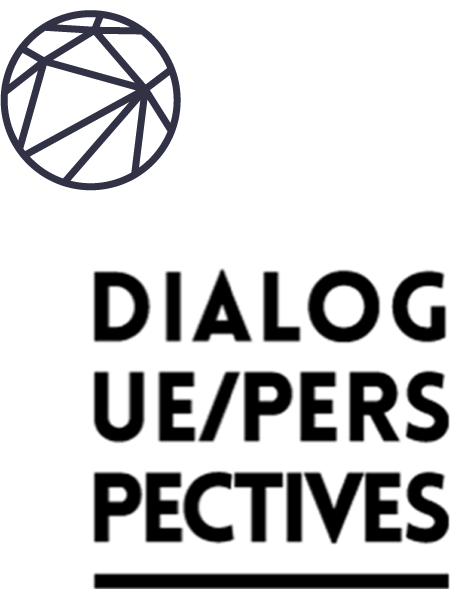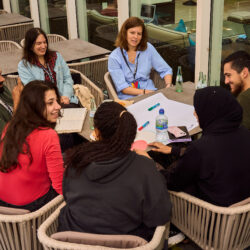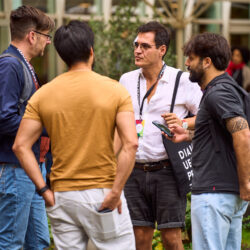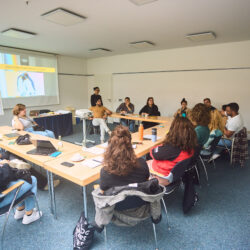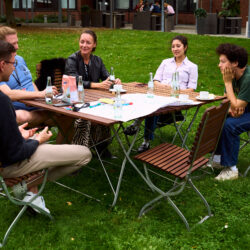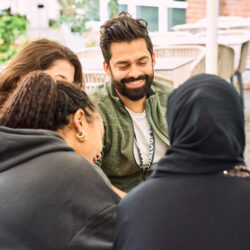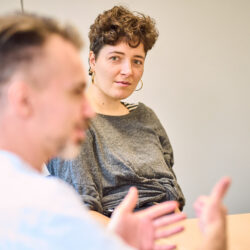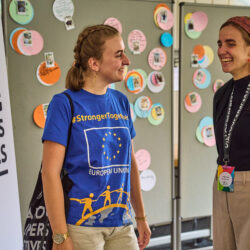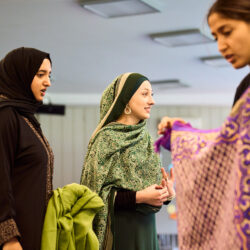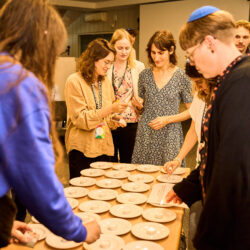Retrospect: Autumn Seminar 2023
From 11 to 15 October 2023, the new cohort of Dialogue Perspectives met for the first time in Bonn to participate in the autumn seminar „Navigating Crises I Tools for Community-based Social Action“. This cohort is made up of 60 future leaders from 15 European countries. They bring with them a diverse range of religious and worldview backgrounds, expertise and skills. The programme offered various forums for exchange, including sessions for open and guided dialogue, thematic workshops and interactive lectures. The main objective of the seminar was to address the current crises in Europe and to develop concrete strategies and tools to face these crises.
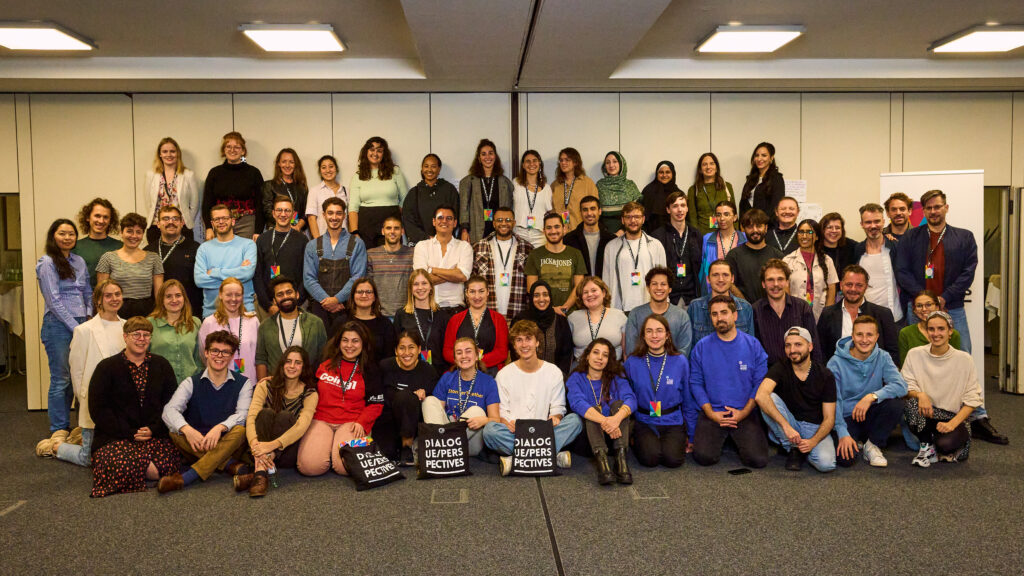
The seminar focused on these four workshops:
Dr Asmae Ourkiya, a climate justice researcher, founder of The Ecofeminist Institute and DialoguePerspectives alumna, led the thought-provoking workshop, “How logical is biological? Climate Justice Conversations through an Intersectional Queer Ecofeminist Lens.”. Over the course of six sessions, the participants were challenged to think deeply about how climate change affects individuals differently based on factors like skin color, socio-economic background, gender, indigeneity, and sexuality. They discussed the significance of allyship and explored how they can become a catalyst for change in their own community. As Arno, one of the participants, put it: “The workshop made me aware of my sustainability privileges, and I feel empowered to use them, share them with my community, and uplift others.”
Under the guidance of Professor Dr Frederek Musall, the second workshop, “Religion ‘in’ Crisis: Challenges, Ambivalences, and Perspectives of Religion in Times of Polycrisis,” delved into the intricate relationship between religion and crises. The participants debated the positive and negative impact religious leaders and institutions can have in times of crisis and societal tensions. Discussions explored the dynamics between religion and democracy, the merits and challenges of religious pluralism, and the practical actions religious institutions have taken to address crises such as climate change and forced displacement. What can be taken away from these discussions? According to workshop member Robert, he learned that “we shall not be tricked into believing that religious pluralism is not a reality already. Europe is a wonderful place with diverse and beautiful people, so it is our duty to have a dialogue about the challenges and beliefs of this reality now.”
Dr Jonas Fegert, Department Head at the FZI Research Center for IT, took the helm of the third workshop, “Strategies for a Resilient Digital Democracy – From Disinformation to Engagement.” The group focused on the challenges of democracies in today’s digital world. The participants explored the role of big tech companies in fighting disinformation and learned about various initiatives that seek to enhance e-participation in local politics and institutions. They also debated the effect social media platforms have on societal discourse and democratic participation. “Gaining insights into the discussions happening in extremist groups left a profound impact on me“, noted Enna, “this underscores the importance of staying aware of these developments.”
In the fourth workshop, led by Melina Borčak, a journalist and filmmaker, participants explored the theme of “Society in Crisis – Navigating Nationalism, Democracy, and Racism in Europe.” The workshop focused on the example of the Bosnian Genocide and highlighted the challenges surrounding social coexistence in an era marked by rising ethno-nationalism. According to Marzhan, one of the participants of this workshop, the sessions helped her gain “a more nuanced understanding of the Bosnian Genocide and heightened awareness of conflict-sensitive journalism“.
The seminar also provided a platform for society-oriented exchange that included different religions and worldviews. This enabled the participants, who represented the enormous diversity of European society, to meet and interact and become experts in interdisciplinary, intercultural, interreligious and solidarity dialogue in Europe.
The participants also had the opportunity to get to know and try out different formats of discussion and reflection under the guidance of Kristina Schneider, Barış Şahin and Maximiliane Linde, a board member of DialoguePerspectives e.V. In the process, they were encouraged to expand their networks and consider together how they can use their diverse identities, backgrounds and resources. They discussed their expectations, personal strategies for addressing crises, and the complexities of power dynamics and identity within this context.
In addition, the participants were given the opportunity to co-create and learn about different religious practices, including Jumu‘ah, Shabbat and Havdalah, as well as an ecumenical Christian service. The shared religious experience was an integral part of the programme and supported mutual understanding between the different religious and ideological backgrounds.
This programme year will also see the development of a community publication, for which the thematic basis was laid in the autumn seminar. The participants developed initial ideas and concepts for their contributions to the publication.
In addition, the group received impulses from various speakers. Johanna Korneli, the programme leader of DialoguePerspectives, opened the event with a contextual classification of the complex European crises in a global context. Prof. Dr. Markus Miessen explained the connections and significance of spatial design and social dialogue formats. In a panel discussion on the topic of diversity competence, former participants of the DialoguePerspectives Network such as Dr Eleonora Pede, Anja Fahlenkamp and Sonya Ouertani shared insights into their work and their different perspectives. They emphasised the importance of a social action-oriented approach based on plurality competences.
The seminar was significantly influenced by the war in the middle east. It included participants with different connections and backgrounds to the events as well as people who are directly affected by them or whose families and friends are.
Given the recent events, we recognised the urgent need for our participants to come together as a group, connect, share experiences, and provide support during these challenging times. It is in these contexts that the potential of diverse groups becomes visible. We believe that by exchanging perspectives and experiences, we can gain a deeper understanding of the situation and discover new ways to collaborate effectively during these trying circumstances.
We are opening regular check-ins for our participants where we would like to meet each other – reflecting together on the current situation, being there for each other, and developing ideas and projects on how we can act together now, how we want to commit ourselves to a future shaped by peace and mutual respect, by solidarity and empathy, by understanding and standing up for each other.
Text: Johanna Gummel
Pictures: Phil Vetter
